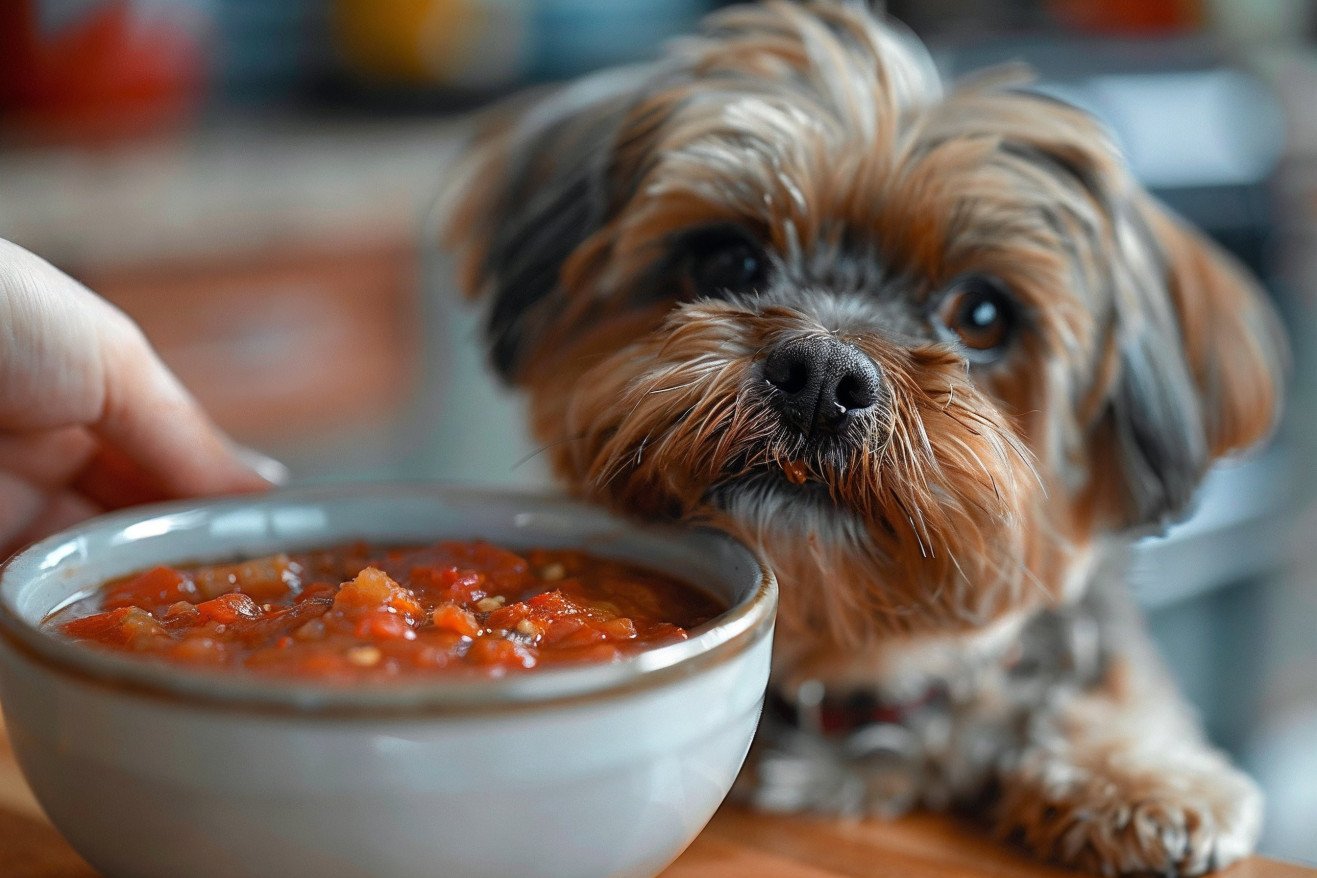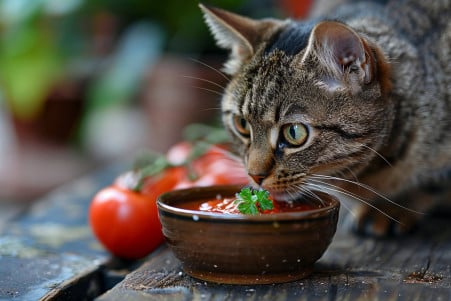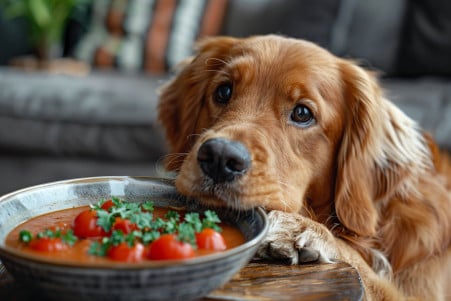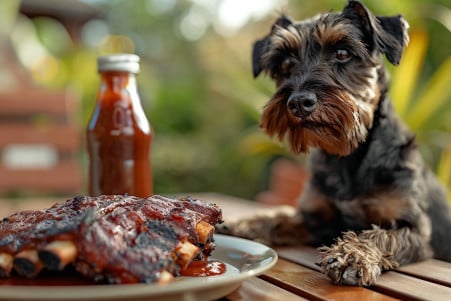Can Dogs Eat Tomato Sauce? A Vet Weighs In
23 March 2024 • Updated 23 March 2024

If you've ever wondered whether the tomatoes and spices in tomato sauce are safe for your dog, you're not alone. Tomato sauce is a staple in many people's diets, and it's natural to want to share your favorite foods with your furry friend. However, while plain tomato sauce is unlikely to poison your dog in small amounts, it does contain garlic and onion powder, which can cause digestive issues and, in the case of onion, anemia if consumed over a long period of time. As a result, it's best to avoid giving dogs tomato sauce and opt for healthier treats.
To help you better understand why this is the case, we referenced a number of veterinary toxicologists, pet nutritionists, and other experts to learn more about the potential dangers, safe doses, and even potential benefits of tomato sauce for dogs. In the end, you'll know exactly when it's safe to give your dog a taste of your leftover marinara and when you should keep it to yourself.
Can dogs eat tomato sauce?
Harmful Ingredients in Tomato Sauce for Dogs
Tomato sauce is often made with ingredients that are toxic to dogs, including garlic, onions, and high levels of salt or sugar. DogTime notes that garlic and onions are poisonous to dogs and can cause anemia by destroying their red blood cells. The AKC says that consumption of these ingredients can result in symptoms like vomiting, nausea, drooling, abdominal pain, and organ damage.
Excessive salt and the high sodium levels that result from it can also be problematic, leading to dehydration and increasing the risk of obesity, diabetes, and heart disease in dogs, according to Hepper. On the other hand, Furtropolis points out that xylitol, an artificial sweetener that is sometimes used in sauces, is especially dangerous to dogs and can result in liver failure and death.
The impact of these dangers will vary based on the amount of the sauce that is consumed in relation to the dog's size and health. For example, a few licks of tomato sauce may only cause a minor stomachache in a large, healthy dog, but it could have a much more serious effect on a small puppy or a dog with health issues. This is why it's important to look at the ingredients in the sauces you're considering and make sure that you don't buy any that have additives, preservatives, or flavorings that are poisonous to dogs.
Risks of Feeding Dogs Pasta Dishes with Tomato Sauce
In addition to the risks of tomato sauce, there are other risks associated with feeding dogs pasta dishes that contain tomato sauce, such as spaghetti or lasagna. PetMD notes that the pasta can be a problem as well, since it’s high in carbohydrates, which dogs don’t digest well. Some dogs are also allergic to wheat, which can cause digestive issues.
Moreover, The Dog People by Rover.com warns that the combination of tomato sauce ingredients like garlic and onions, as well as the pasta, can be toxic. If a dog eats a large amount of this dish, they may experience vomiting, diarrhea, lethargy, and in some cases, anemia.
If your dog eats a pasta dish that contains tomato sauce, it’s important to watch them closely and call your vet immediately. They can help you determine if your dog needs to be treated and will consider factors like your dog’s size, the amount of pasta they ate, and any underlying health issues. In the meantime, stick to safer options if you want to share food with your dog, such as plain cooked pasta or sauces made specifically for dogs that don’t contain any toxic ingredients.
First Aid and Veterinary Treatment for Tomato Sauce Ingestion
If your dog has eaten a large amount of tomato sauce, it is important to contact your vet or a pet poison control hotline immediately. Cornell University College of Veterinary Medicine notes that you should be prepared to tell them the type and amount of sauce your dog ate, as well as your dog's weight and any health issues they may have. This will help the vet professionals understand how serious the situation is and what steps you should take.
In some cases, this may mean that you are asked to induce vomiting or give your dog activated charcoal to help absorb the toxic substances. Dogster recommends that you watch your dog for symptoms like vomiting, diarrhea, lethargy, or an abnormal heart rate, and that you take them to the vet immediately if you notice any of these symptoms. Acting quickly and being honest and thorough with your vet can help prevent your dog from getting seriously ill or experiencing complications from eating tomato sauce.
Homemade vs. Store-Bought Tomato Sauce for Dogs
While store-bought tomato sauces may be easier to buy, BeChewy warns that they often include preservatives, additives, sugar, salt, and other spices that aren’t good for dogs. Homemade tomato sauce is a much better option because you can control what goes into it and avoid any harmful additives.
If you decide to make your own dog-friendly tomato sauce at home, BeChewy suggests using fresh, organically grown tomatoes and washing them thoroughly. The tomatoes themselves are safe for dogs, but the green parts of the plant, including the leaves and stems, and any unripe tomatoes should be avoided because they contain solanine and tomatine, which can lead to digestive upset. Cooking and mashing or pureeing the tomatoes is even better because it makes the antioxidant lycopene more bioavailable.
It’s important to never add onions or garlic to the tomato sauce because both are toxic to dogs and can cause digestive issues. BeChewy also warns against using canned or jarred prepared tomato sauces because they often include spices and preservatives that aren’t safe for dogs.
If you decide to go with store-bought tomato sauce, make sure to read the label and pick one with the fewest additives and spices. Another good option is to use unsalted and unseasoned plain canned tomatoes because they’re more likely to be made with just the ripe, red fruit.
Conclusion: Tomato Sauce and Canine Consumption
So, can dogs have tomatoes? The answer is a little bit yes and a little bit no when it comes to dogs and tomatoes. Ripe, red tomatoes are generally safe for dogs and can be given to them in small amounts as a treat. However, the plants are part of the nightshade family and the fruit contains solanine and tomatine, which are toxic to dogs and can be dangerous, especially in the unripened, green parts of the plant.
The AKC notes that tomatine poisoning in dogs can cause symptoms such as loss of coordination, muscle weakness, gastrointestinal distress, and even cardiac issues. However, this type of poisoning is rare and most dogs will make a full recovery.
Even though dogs can eat ripe tomatoes, tomato-based products like tomato sauce and ketchup often contain other ingredients that are toxic to dogs, such as garlic and onions. Purina also warns against giving dogs canned, tinned, or processed tomato products because they often contain preservatives, salt, and other additives.
To sum up, tomato sauce is something that should be given to dogs in moderation. While a small amount of plain, homemade tomato sauce is probably okay, the risks of garlic, onions, and salt poisoning mean that it's best to avoid giving this human food to our four-legged friends. It's always best to put your dog's health first and speak to a vet if you have any concerns about what you're feeding them.


